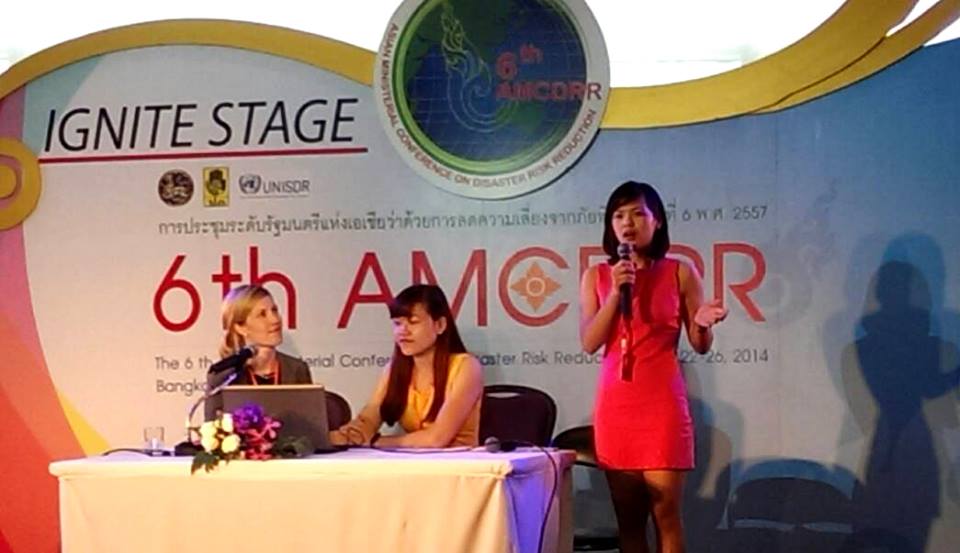- About Us
-
Who we are
-
- Publications
-
- ADPC Academy
-
MediaADPC'S NEWS
AMCDRR: Encouraging risk-informed investments as part of the business process AMCDRR: Encouraging risk-informed investments as part of the business process
24 Jun 2014
Bangkok, Thailand
In the Bangkok Declaration, The sixth Asian Ministerial Conference on Disaster Risk Reduction called for governments and stakeholders to act on strategies for enhancing local resilience. They also called for the improvement of public investments for disasters and climate risk management, increased public and private partnerships and developing the use of science, technology and innovation for disaster risk solutions.
Held in Bangkok at the end of June, the ministerial conference served as the final regional inter-governmental meeting in Asia before the third UN World Conference on Disaster Risk Reduction in Japan in 2015 that will review the implementation of the Hyogo Framework for Action and adopt a post-2015 framework for disaster risk reduction.
From reactive to proactive strategies
Organized jointly by United Nations Economic and Social Commission for Asia and the Pacific (ESCAP) and ADPC, the Technical Session III at the ministerial conference dealt with the role of the private sector in disaster risk management. During the session, the roles, responsibilities and accountability of the private sector in disaster risk management, and strategies to improve engagement in disaster risk management were discussed.
“The post-2015 framework on disaster risk reduction is a perfect opportunity to directly address engagement and investment from the private sector in disaster risk management,” said Aslam Perwaiz, Head of Disaster Risk Management Systems from ADPC.
One of the key recommendations from multiple speakers was a change in mindset from reactive to proactive strategies. During the session, it was also stated that businesses, both large and small, can plan ahead for disasters by making risk sensitive investments, analyzing what other businesses are doing, and working with them to form a disaster preparedness strategy. It was also suggested that different levels of government and NGOs can help develop frameworks, strategies and learning materials, to help businesses better prepare for disasters.
It was stressed that the linkages of international supply chains and the significant role that the private sector has domestically creates a responsibility to mainstream disaster risk reduction both to ensure business continuity, and protect the livelihoods of those
within the country.Building community resilience in Thailand
Organized jointly by ADPC, the Office of the Royal Development Projects Board, Department of Disaster Prevention and Mitigation, Thai Red Cross and Kasetsart University, the special session I showcased the success of Thai communities that have abided by the Royal Philosophy of Sufficiency Economy and how the philosophy could be employed in disaster risk management.The philosophy places importance on using moderation to govern one’s own actions while also adhering to individual moral values. Inherent in this philosophy is self-sufficiency. If communities take responsibility for their own wellbeing through disaster management in addition to relying on existing government institutions, community vulnerability can be significantly reduced.
Mr. Anusorn Kaewkangwan, Deputy Director General of the Department of Disaster Prevention and Mitigation, discussed how community-based disaster risk reduction was a key factor in self-help during any disaster situation. With the proper knowledge and skills communities could reduce local vulnerability considerably, he argued.
Leaders from Samut Sakhorn, Ayutthaya and Phattalung in Thailand displayed that grass roots solutions developed at the community could be more effective than those developed at the government level. Furthermore, by being proactive, communities could reduce the burden on public help systems thus increasing their effectiveness in disaster situations.
On the Ingnite Stage: Mrs. S Marina Mohamed, Permanent Secretary, Ministry of Disaster
Management, Government of Sri Lanka and Mr. Kep Kannaro, Executive Director of
Partnership for Development in Kampuchea and Chairman of Cambodian Humanitarian
Forum, discussed experiences from ADPC’s Disaster Resilient Leadership training together
with ADPC's Head of Department Mr. Sisira Kumara (in the middle).
On the Ignite Stage: The winners of ADPC’s iPrepare student campaign shared their story
and video on how their home community prepares to floods.Latest NewsRelated Trainings
-